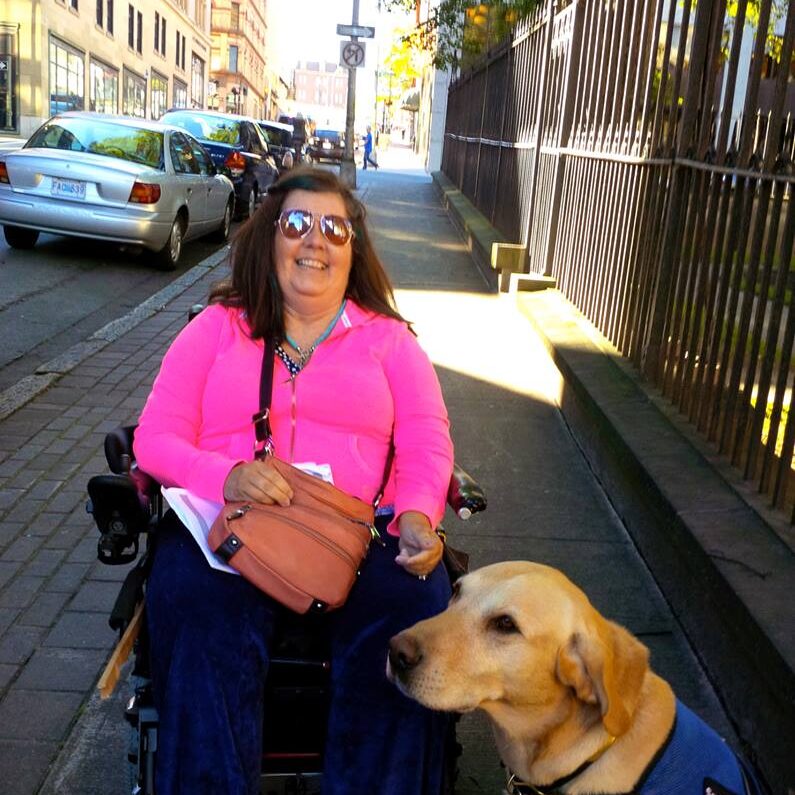
Disability representative: Mary MacDonald
Sole candidate believes disability community has been ignored by DSU and Dal administration
Name: Mary MacDonald
Hometown: Halifax, NS
Major, year: BA (Hons) International development studies -Dalhousie, MBA – Dalhousie, MA (Ed) in progress
Mary MacDonald also recorded her answers to the Gazette’s questions to make them accessible.
What are the issues within the disability community?
I use a wheelchair and thus the issues with which I am most familiar are those affecting mobility. There are a range of other types of disabilities, including learning, intellectual, the deaf and hard-of-hearing community, the visually-impaired and others.
Some issues include the willingness of instructors and faculty to make students with disabilities feel welcome and included in the classroom. Some students may find it challenging to write exams because they require specific accommodations. The specific issues of concern to students with disabilities are as diverse as the varied types of disabilities themselves.
As a student with limited mobility, the bike lane on University Avenue and the manner in which it was implemented was –and remains – a specific issue of concern. The bike lane extends beyond impacting students with disabilities to the wider community who want to access buildings such as the Rebecca Cohen.
If you became your community’s representative, what do you plan to do?
If I became the Community Rep for students with disabilities on campus, I would consult with students to understand their concerns and desired outcomes. I would try to offer solutions and bring those concerns to the Dal Student Union. I would also write articles about these topics so others can gain insight into the challenges affecting this group of students.
Why do you want to represent the disability community?
I would like to represent this community because I have observed changes that have happened on campus over the long-term. I believe this is a community whose issues and challenges have not been addressed effectively over the years. It is fair to say that in every sense, the issues impacting this community have been neglected and marginalized.
In recent years, the DSU has been distracted and preoccupied by other peripheral issues off-campus while students with disabilities are asking, “What about us?” It’s as though there is a lack of understanding of the barriers faced on a daily basis by students with disabilities.
Students with disabilities do experience discrimination on campus. Students with disabilities pay levies and fees toward our campus organizations as well as to use university facilities. All too often they find themselves excluded from class get-togethers arranged by campus societies, they pay fees only to find that a facility is not accessible, and they do not hear their concerns acknowledged by elected student leaders. I would like to see this change, with the focus of elected student leaders re-centered on what is happening within the bricks and mortar of the Dal campuses as opposed to causes half a world away. It is not to say other issues do not exist, but that Dalhousie students should be prioritized first.
How have you been involved with the disability community and its constituents?
Over the years, I have been interviewed by the Dalhousie Gazette on topics affecting wheelchair-users on campus. More generally, I have participated in multiple interviews on disability issues with both the CBC and Chronicle Herald.
When the DSU hosted a Town Hall on the bike lane, I attended and voiced my concerns about possible adverse consequences. I was in touch with the HRM Councillor for the South End, who was a supporter of the bike lane. Last week I made a presentation to the Law Amendment Committee at Province House, on the proposed Accessibility Act. Dal Law Professor Archie Kaizer made a verbal and written submission to lawmakers that same day, as he is an advocate for the rights of person with disabilities in Nova Scotia. If chosen as Community Representative for students with disabilities, I would seek out Professor Kaizer’s expertise in the area of disability and accommodations as required.
What is your favourite thing about the disability community?
My favourite thing about this community is their deep understanding and resilience. Persons with disabilities have an understanding that we are guaranteed nothing and when unexpected events or changes happen, we must find resources we didn’t know we had. Persons with disabilities are resilient in finding solutions to complex problems. Most of all, persons with disabilities understand that we must not dwell on our differences with others in finding solutions. Rather, we focus on the goodwill of persons from all backgrounds because a myopic perspective that assumes there are no “safe spaces” is counter-productive.






